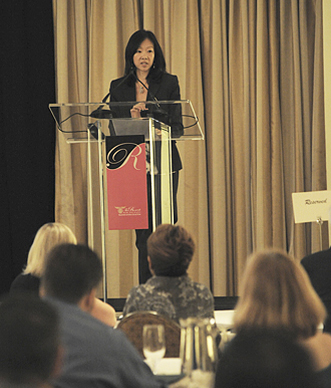Moving Forward With Vision
As a major conference on New Orleans' role in urban innovation opened on Friday (Oct. 1), Amy Liu of the Brookings Institution set an optimistic tone about the city's future, with a cautionary note that “the story of the city is still unfolding.”

Amy Liu of the Brookings Institution gives the opening keynote address at the urban innovation conference, saying that New Orleans needs to move with more vision and take risks to move to the next level. (Photo by Sally Asher)
The conference, “New Orleans as the Model City for the 21st Century: New Concepts of Urban Innovation,” sponsored by the Rockefeller Foundation and Tulane University, brought together more than 200 leaders from government, academia, business and nonprofit organizations.
“I have enormous optimism about the capacity of the people, the nonprofits, the institutions, the new mayor, and really taking the future into your own hands. And that capacity is absolutely critical â¦,” Liu said.
She told the assembly at the Roosevelt Hotel that she does not want New Orleans to be just a model of post-disaster recovery, mentioned every five years. “What I hope is that we talk about New Orleans when we ask which city is doing it really well.”
To be a model city that is prosperous and resilient, New Orleans needs “to move with more vision, more intentionality and take risks,” Liu said.
The conference offered breakout sessions on innovations in housing and community development, heath care, education reform, urban infrastructure, green technology and “growing tomorrow's entrepreneurs.”
Dr. Karen DeSalvo, vice dean of community affairs and health policy at the Tulane School of Medicine, moderated the heath care discussion. DeSalvo, who has led the charge for sweeping changes in community-based health care in New Orleans since Hurricane Katrina, said, “We have laid out a blueprint for the transformation of health care. And now we are ready to open the next chapter.”
The importance of collaboration was one theme of the day. In a session on urban planning moderated by Kenneth Schwartz, dean of the Tulane School of Architecture, Schwartz mentioned the Dutch Dialogues Dutch engineers, architects and planners who have interacted with their counterparts in Louisiana as an important collaboration in water and flood management.
“Sustainable solutions need different approaches. And I have optimism that we can take lessons that we have learned and take them to another level,” Schwartz said.
